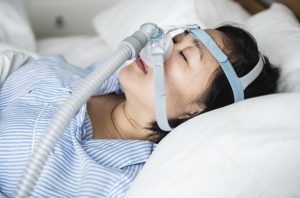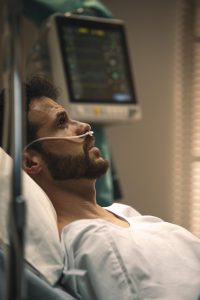 what exactly is sleep apnea?
what exactly is sleep apnea?
Sleep apnea is when there is an obstruction of the airway during sleep. When we sleep
at night the muscles in our necks relax slightly. And the tongue has a natural tendency to go
backward. And the combination of what your weight is and what your genetics are, what
Mom and Dad have given you as far as how big that opening is gonna be in the back of your
airwas will determine whether that tongue is going to obstruct the airway or not. And
when it does that’s called obstructive sleep apnea.
Position can affect sleep apnea?
Position can affect sleep apnea greatly. Especially if it’s in the mild form of sleep apnea.
WATSON Sleeping on the side is less likely to fall back. But when you lay supine on your back it’s more likely to happen. And also people tend to think, “Oh, I’m a side sleeper. But that’s not always true. When we do the studies we see that most of the time people during sleep will roll on their backs for some time. And their obstruction is usually worse at that time.
Different types of apnea:
The major one that we’re talking about today is obstructive. There is something else called central is that sometimes mixed with obstructive. But for the most part, plain obstructive sleep apnea is the way that I describe it to you. Central would be coming from the brain. And sometimes there are mixes of both of them. But, yes, there are degrees of severity. Everyone stops breathing a little bit when they sleep. If it happens five times or less it’s considered normal. If it’s 5 to 15 it’s mild sleep apnea. Fifteen to 30 is moderate sleep apnea. And over 30 is severe.
how do you measure that?
we’re talking about the episodes of how many times you stop breathing in an hour. So less than five means you’re only – you stop breathing less than five times an hour which is normal. If you stop breathing 32 times an hour that would be in the severe category. Now, the duration of the amount of time that you stop breathing doesn’t really matter in the diagnosis of whether you have sleep apnea. But clinically speaking if you’re having a longer period of time that you stop breathing then the effects of that sleep apnea might be more severe.
symptoms of sleep apnea?
Most of the time it’s picked up when you’re with your primary care physician. And you may be complaining of daytime sleepiness and Coughing at night. Waking up coughing or gasping. Dry mouth. Headache in the morning is another one. You wake up with a headache every morning.
how is sleep apnea dangerous?
well it’s dangerous for a number of reasons first of all we treat sleep apnea mainly for the sleepiness effects in the mild sleep apnea because we don’t want you to be sleepy we want you to have a good quality of life you don’t want you falling asleep at the wheel or falling asleep in the theater or with family but when you start getting into that moderate to severe sleep apnea and you stop breathing you know 20 30 40 i’ve had seen it as high as 102 times an hour then we start worrying about the stress on your heart okay basically when you what happens is when you fall asleep and your airway becomes obstructed by sleep apnea your tongue falls in the back of your throat then your oxygen goes down when your oxygen goes down your body says oh i’m not getting enough oxygen increase that heart rate and then it jacks up your heart rate then your body says no that’s not working wake him up so then you wake up you may totally wake up or you may come right below the surface but in either case you’re waking up enough that you move your head a little bit open up that airway and go back down to
sleep and so depending on how many times how severe your sleep apnea is determined how many times that’s happening through the night so I tell a lot of my folks to remember when you were a kid and you did an all-nighter and you stayed up all night and then next day you weren’t too good for anything anymore right that’s what happens with sleep apnea you’re coming up and you’re not getting any sleep and so the next day you’re tired.
